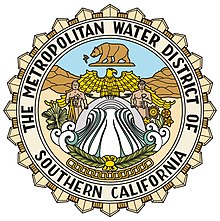 | |
| Water district overview | |
|---|---|
| Formed | 1928 |
| Headquarters | 700 North Alameda Street, Los Angeles, California 34°3′17″N 118°14′11″W / 34.05472°N 118.23639°W |
| Water district executive |
|
| Website | www |
The Metropolitan Water District of Southern California is a regional wholesaler and the largest supplier of treated water in the United States. The name is usually shortened to "Met," "Metropolitan," or "MWD." It is a cooperative of fourteen cities, eleven municipal water districts, and one county water authority, that provides water to 19 million people in a 5,200-square-mile (13,000 km2) service area. It was created by an act of the California State Legislature in 1928, primarily to build and operate the Colorado River Aqueduct. Metropolitan became the first (and largest) contractor to the State Water Project in 1960.
Metropolitan owns and operates an extensive range of capital facilities including the Colorado River Aqueduct which runs from an intake at Lake Havasu on the California-Arizona border to its endpoint at the Lake Mathews reservoir in Riverside County. It also imports water supplies from northern California via the 444-mile (715 km) California Aqueduct as a contractor to the State Water Project. In 1960, Metropolitan became the first (and largest) contractor to the State Water Project. Metropolitan's extensive water system includes three major reservoirs, six smaller reservoirs, 830 miles (1,340 km) of large-scale pipes, about 400 connections to member agencies, 16 hydroelectric facilities and five water treatment plants.
It serves parts of Los Angeles, Orange, San Diego, Riverside, San Bernardino and Ventura counties. The district covers the coastal and most heavily populated portions of Southern California while large portions of San Diego, San Bernardino and Riverside counties are located outside of its service area.
The Metropolitan headquarters is in downtown Los Angeles, adjacent to Los Angeles Union Station.
- ^ Roth, Sammy (October 17, 2024). "Column: Something is rotten in SoCal's Metropolitan Water District". Los Angeles Times. Retrieved October 18, 2024.